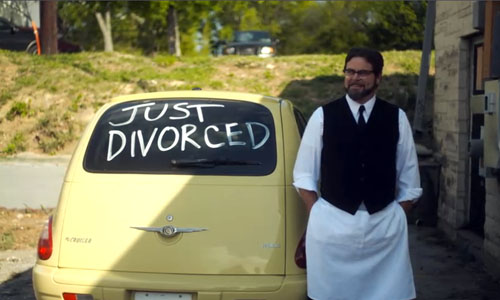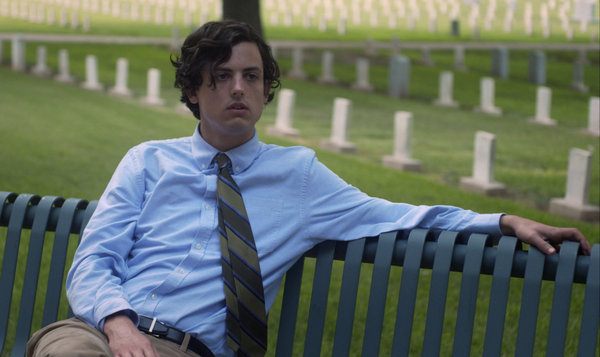Many a Whit Stillman character has pondered if people really change. In Barcelona it’s argued that you can’t change, but you can change your context. Somebody Up There Likes Me, a somber Austin indie by Bob Byington (who also shares directing responsibility in the omnibus Slacker 2012, also screening at SXSW this year), tests this theory, actually quite literally.
Appearing out of nowhere at Austin-Bergstrom International, Max (Keith Poulson) returns home to find his ex-wife (Kate Lyn Shell) in bed with another man. He attempts to iron things over by bringing flowers…. from a roadside memorial he passes and then reverses to stop by. He takes a job at an upscale steakhouse and befriends Sal (Nick Offerman), a mentor and father figure. The film will continue to track their relationship for the next 35 years, jumping ahead 5 years at a time.
They never age; their context changes but they never change. They tell themselves exactly what they think, without a filter. Five years into his marriage to Lyla, an awkward girl played by Jess Weixler, they have a kid, their kid has a kid and Max becomes an absentee parent – and thus is life, it just happens; you can be passive, you can be honest, it is inevitable.
The performances are intentionally flat, its characters are ambiguous at best, indifferent at worst. They share the same detachment as Charlie Theron’s Mavis Gary in Young Adult, and although Mavis reflects on her past for a weekend, Max and Sal live 35 years together as Sal has an affair with and marries Lyla who once referred to him as the “waiter living in the house behind our house.”
The dialogue and tone are lucid, as if these characters are living the circumstances of a pre-determined screenplay. The performances, while good, are intentionally lifeless. Strangely this is refreshingly bleak. Their self-obsession (particularly Sal) they think, they feel, but they never learn to remedy. For Sal and Max to end up in the position they do at the end of the film, someone up their must like them; these are not members of the lucky sperm club.
The film goes full circle, returning us to an another ambiguous time. It’s not uncommon for an actor to play the same role twice, and this does happen in life – someone who looks like someone else can appear and play a different role for you. Somebody Up There Likes Me lacks subtlety, like a skeleton watch, showing us the gears working. Byington is fully in control and has crafted the most detached comedy of the year thus far. In some ways he is able to achieve a spot-on truth.
To paraphrase Sal “if you’re looking for sympathy, I suggest you try a different chophouse”.



